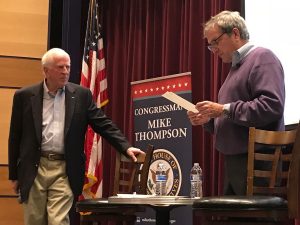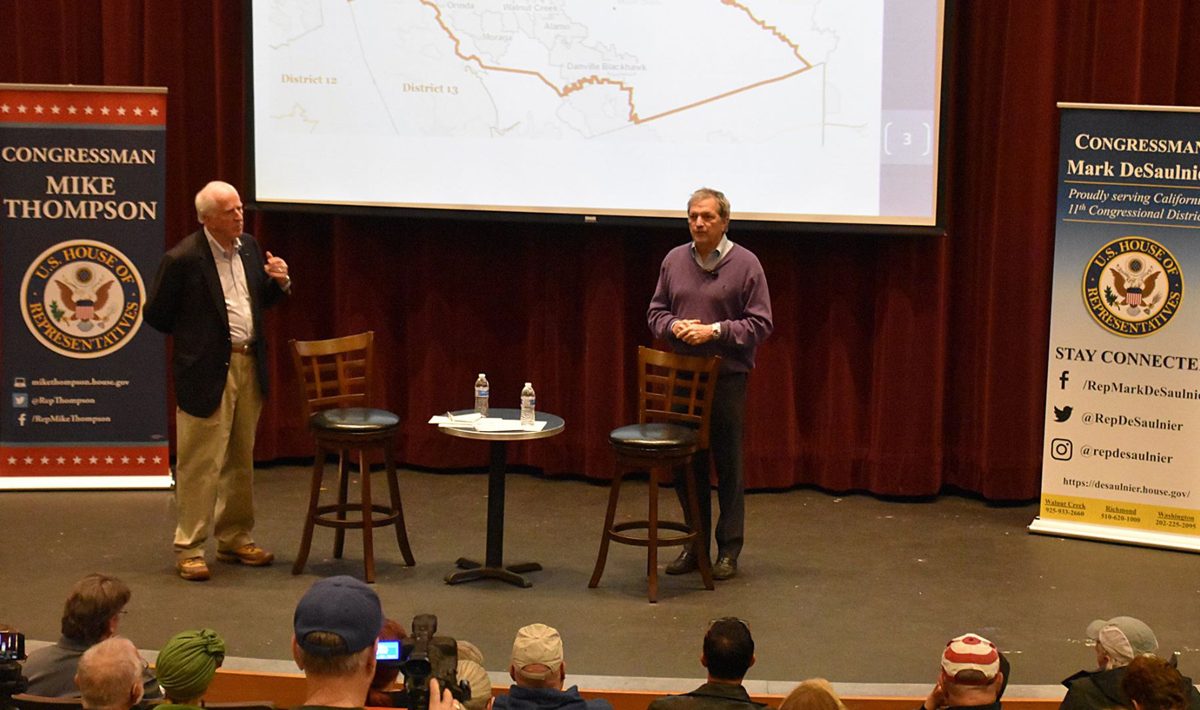
It has more cosigners than the minimum number of votes to pass, he said.
Thompson (D-Napa) and U.S. Rep. Mark DeSaulnier (D-Walnut Creek), whose district also contains part of Martinez, spoke to a crowded Performing Arts Building of Alhambra High School Saturday afternoon, explaining not only HB8 but other approaches to reducing gun violence.
DeSaulnier has a personal interest in reducing gun violence and making it more challenging for some people to obtain a firearm. While under care for depression, DeSaulnier’s father managed to obtain a gun and commit suicide. “He shouldn’t have gotten a gun,” he said.
Citing numbers that have been shared by the Brady Center based on 2011-15 death certificates, and the National Center for Injury Prevention and Control emergency room admissions estimates for 2010-2014, DeSaulnier called gun violence a public health issue.
Each day, there are 342 incidents of gun violence, of which 100 result in death, he said. About two-thirds of those are suicides, and 9 involve those 20 or younger.
Thompson is the chairperson of the House’s task force on reduction of gun violence, established after the Sandy Hook Elementary School tragedy in 2012 in which 20 children and six adults were slain by a solitary gunman.
An outdoorsman, hunter and collector, Thompson tried to present a realistic picture of what types of laws regulating firearms might clear Congress, and he described many that did not get so much as a single hearing.
With 40 House seats that voters shifted from the Republican to the Democratic party, Thompson became optimistic HB8 might move forward. It has cleared the Judiciary Committee and soon will face a full vote of the House, he said.
It won’t love all of the problems of “the wrong people” getting guns, but it closes some of the loopholes, he said.
Mike Grant, who owns Gun Repair Unlimited in Dublin, surprised Thompson by saying it doesn’t go far enough.
A member of the audience who posed a question, Grant said gun stores must conduct background checks – and he does. But he’s troubled that people can go to gun shows and obtain a weapon from a private individual who has a table at the show.
Or they may buy from family members, he said. “There are felons with families,” he pointed out.
He described the 2018 shooting at a Nashville, Tenn., Waffle House, in which four died and four others were injured. The suspect had a history of mental health issues and had lost his Illinois firearms authorization after he crossed a barrier at the White House. The man’s father was given custody of his guns, but then is believed to have given his son the prohibited weapons. The man was arrested, was found incompetent to stand trial and was committed to a mental hospital.
“I believe all firearms should go through a firearms dealer,” said Grant, who identified himself as a Republican. “I get beat up on this – it’s got to stop.”
The two members of the House described the challenges they have faced trying to close loopholes or take other approaches to reduce gun violence while operating under the Second Amendment and not stigmatizing mental health issues.
And Thompson said HB8 wouldn’t end all gun violence, that only a complete ban would accomplish that. Many in the audience cheered the thought of that option, although Thompson said he wouldn’t support it.
But several audience members worried that government is treading on their rights as it adds requirements or expands the list of who should be prohibited from owning a firearm.
One questioned why HB8 doesn’t make exception for collectors of antique firearms. Another said the restrictions affect the law abiding, not those who are willing to skirt regulations.
“The problem is with lawless people,” one attendee said.
Others wanted to know whether the two members of Congress would endorse reciprocal laws that would allow those who obtained permission to carry concealed weapons in one state to be allowed to have those concealed weapons in other states. They would not, they said.
Nor would they favor arming teachers, saying instead school resource officers should be the trained professionals carrying firearms.
Teachers, DeSaulnier said, “have enough to do.”
One attendee wondered about the root cause of shootings. Thompson said the United States has more gun violence than other countries, although that doesn’t mean this country has more mental illness or provocations from video games.
And HB8 doesn’t address either mental illnesses or video games, he said. Instead, it deals with increasing background checks “to prohibit those who are prohibited from having guns.”
There are other matters to address, Thompson said – age limits, magazine capacity, bump stocks that allow a firearm to be shot more rapidly, assault weapons and what now is described as the “Charleston loophole” – delays in background check results.
According to Time Magazine, 4,170 guns were sold in 2016 to people with something in their backgrounds that would have prevented them from making the purchase because FBI background checks weren’t completed in a three-day deadline.
The name comes from the 2015 Charleston, S.C. church shooting in which nine people were killed by a convicted felon whose background check results arrived too late to prevent him from buying a gun.
Both agreed times have changed. DeSaulnier told of a constituent who described a time in which it was common to see a long gun in a rack at the back of a pickup truck. Thompson said that at one time, the National Rifle Association focused more on gun safety training and hunter certification than marketing weapons.
At one time, people bought firearms from a gun store. Now they turn to the Internet, Thompson said.
The two encouraged acknowledging that times have changed, noting that at one time people avoided committing crimes because it wasn’t right, whereas now some avoid criminal activity because they fear getting caught.
“Background checks are the first line of defense,” Thompson said. And it’s supported by 93 percent of the American public, he added.
Other approaches help, too, such as gun buy-backs, reduce available weapons. In fact, one of his first buy-backs, in Vallejo resulted in the turning in of enough guns to fill four longbed pickup trucks.
While some have told Thompson that “those guns aren’t the ones used in crimes,” he answers that they may be stolen by criminals who use them later.
Other guns can be recovered from those who become convicted felons and legally are no longer authorized to keep their weapons. California keeps records on some gun purchases, Thompson said, and at times teams are sent to homes, offering a person no longer qualified to own a gun to give up the weapons voluntarily.
“But it’s expensive,” he said. The approach is done cautiously; the house is surrounded, he said.
Saturday’s town hall had more questions than time for answers, although DeSaulnier encouraged fact-based discussions, and both encouraged other organizations to allow engaged discussions of what DeSaulnier called “a frustrating issue.”
“Let’s have conversations with experts,” he said.





